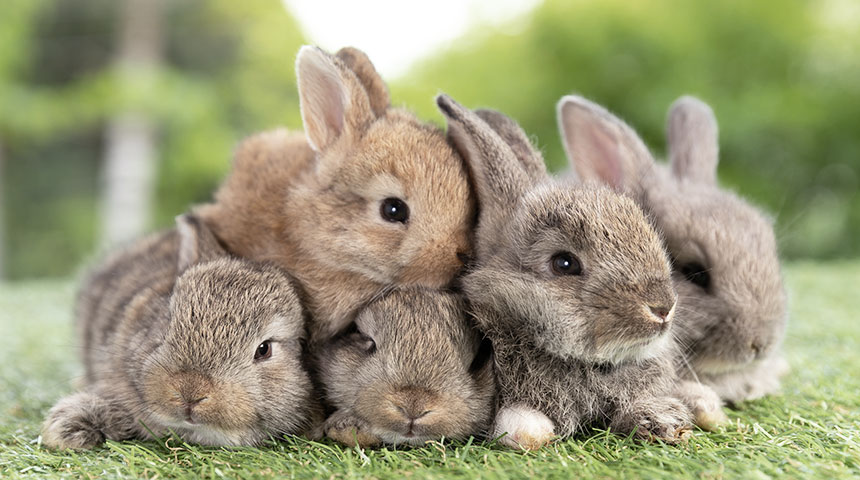
Female rabbits enter puberty at 4 to 6 months of age, depending on the breed (up to 8 months in some giant breeds). They can then become pregnant if mated with a male. We recommend separating non-neutered males from fully fertile females and preventing any contact to avoid unwanted pregnancies.
The gestation period for female rabbits is 29 to 35 days. The doe can have a litter of variable size (2 to 12 kits). During the last week of gestation, the doe will demonstrate nesting behaviour, forming a nest with available material and her own fur. During delivery, the doe should rapidly expel her fetuses and placenta (often in less than 30 minutes). A female rabbit having delivery difficulties (dystocia) will present severe abdominal contractions, repeated over time without expulsion of the fetus, vaginal discharge (often bloody) and up to a deterioration in her general condition. Dystocia is a vital emergency requiring immediate veterinary assistance.
Kit Care
In domestic or wild rabbits, lactation is of very short duration. The doe feeds her kits once a day, for 3 to 5 minutes. It is therefore normal for the mother not to be present in the nest with the young. However, it is possible to observe the kits from a distance to ensure that they have a glossy skin and coat, are active and show normal growth and gradual weight gain.
Baby rabbits will open their eyes at around 10 days old and start eating food from 8 to 12 days. They should be eating hay and solid food by 21 days of age, and should be completely weaned from milk by 4 weeks of age. Water should be offered at the same time as solid food, and greens can be introduced gradually from the 2nd week of life on.
Orphan Kits
In certain situations, kits can be abandoned by their mother or become orphans (mostly with primiparous rabbits, i.e., at the first litter).
In these cases, neonatal care must be assumed by the owner.
Baby rabbits should be kept warm, ideally in their nest, as they are highly susceptible to hypothermia. Kits should be fed milk three times a day to reduce bloat and provide the right number of calories. At every meal, they should be able to drink as much as they want without limitation, but without ever being forced to do so. Weigh each baby once a day to ensure proper growth, and monitor the amount of milk ingested at each meal. Rabbits don't usually need to be stimulated to urinate and defecate, but it's still recommended to do so up until one week of age.
Kit Milk Replacer Recipes
Recipe #1
- ½ cup evaporated milk
- ½ cup water
- 1 egg yolk
- 1 tablespoon (15 ml) corn syrup
Recipe #2
- ½ cup kitten milk replacer
- ½ cup water
- 1/8 cup 35% cream
A probiotic and a few drops of a children's multivitamin can be added to the mixture. The milk replacer can be kept for 24 hours in the refrigerator.
How to feed kits:
- Prepare the replacement milk/mixture and heat in a bain-marie.
- Check temperature by putting a little milk on your wrist.
- Hold the rabbit on its stomach and feed it orally from a puppy/kitten bottle or by syringe with a teat.
- After feeding, rub the rabbit's hindquarters with a warm, moist wipe to stimulate urination and defecation.

